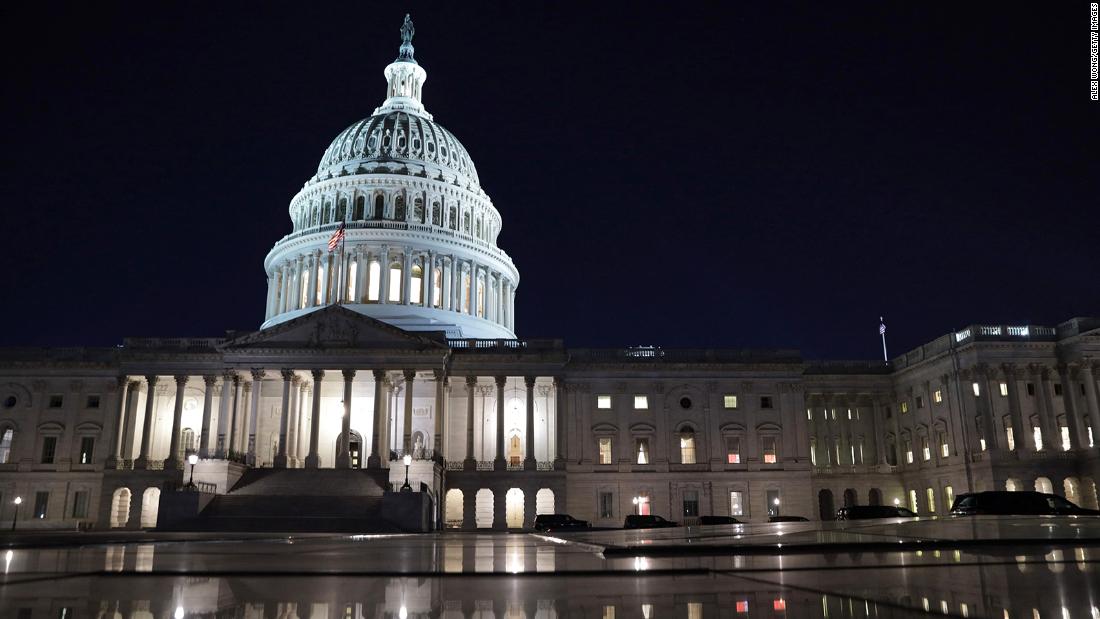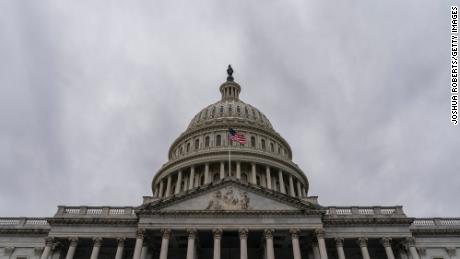Senators have paved a way forward for the Covid relief bill after activity ground to a halt due to an impasse on unemployment benefits
After hours of gridlock, Democrats reached a deal they believe clears the way to pass the plan, securing Manchin’s support after Biden himself intervened.
Activity in the Senate ground to a halt amid a holdup over unemployment benefits, with Manchin being pulled in two directions — by Republicans who attempted to win him over on a proposal they had crafted and by the White House. The dispute was a sign of the centrist Democrat’s power in the 50-50 Senate, where Democrats control the narrowest possible majority, and an example of how a single senator can derail the President’s agenda.
The day started after Democrats and the White House reached their own last-minute agreement.
Democrats cut a deal on Friday morning in order to head off a competing amendment by Republican Sen. Rob Portman of Ohio, whose plan to extend $300 in weekly jobless benefits might have gotten enough votes to amend the underlying Covid relief bill. So Democrats decided to pare back their own jobless benefits, from $400 in the current bill to $300 per week — and sweeten the pot, allowing people to deduct the first $10,200 from their taxes.
Yet that sweetener only soured Manchin, who had not signed off on the deal before it was announced, prompting a frantic scramble behind the scenes to secure his support after he balked at the proposal.
After hours of negotiation, Senate Democrats later offered — and passed — an amendment to extend the enhanced unemployment insurance program through September 6 at a rate of $300 per week as part of an agreement that Manchin accepted.
The agreement will make the first $10,200 in benefits nontaxable and includes a provision that the West Virginia Democrat secured to ensure that the benefit applies only to households making less than $150,000.
In the end, Manchin also secured a deal where the jobless benefits will expire roughly a month earlier than they would have under the deal cut Friday morning. Under that agreement, benefits would have been extended through September.
Manchin released a statement on the deal Friday evening, saying, “We have reached a compromise that enables the economy to rebound quickly while also protecting those receiving unemployment benefits from being hit with unexpected tax bills next year.”
White House press secretary Jen Psaki said in a statement Friday evening that Biden “supports the compromise agreement, and is grateful to all the Senators who worked so hard to reach this outcome.”
Vote-a-rama underway
The Senate is now undertaking a series of politically tough amendment votes that will stretch into Saturday, the last major hurdle senators face before voting on Biden’s top legislative priority.
The first amendment vote — on a measure to raise the minimum wage to $15 a hour, introduced by Vermont Sen. Bernie Sanders — was an early test of party unity.
Eight senators in the Democratic conference — Jon Tester of Montana, Kyrsten Sinema of Arizona, Manchin, Angus King of Maine, Jeanne Shaheen and Maggie Hassan of New Hampshire, and Chris Coons and Tom Carper of Delaware — opposed the minimum wage amendment, along with every Republican senator.
The measure failed with the gavel finally going down on the first amendment vote of the vote-a-rama, 11 hours and 50 minutes after it began, making it the longest roll call vote in recent Senate history. The Democratic negotiations over the unemployment benefits had held up the marathon vote series, keeping the vote open for an extended period of time.
Democrats then rejected a Republican motion to adjourn late Friday, banking that Republicans will grow weary and won’t offer as many amendments.
Early Saturday, the Senate adopted Portman’s plan to extend weekly jobless benefits at $300 through July 18.
Manchin also voted for the GOP proposal, but the Democrats’ alternative plan, which was adopted early Saturday morning, will supersede the Portman amendment.
Votes follow overnight reading
Under the protocols surrounding the bill, the Senate had up to 20 hours for debate, followed by the vote-a-rama. However, following the conclusion of the bill’s reading around 2 a.m. ET Friday, Democratic Sen. Chris Van Hollen of Maryland rose to ask for a unanimous agreement that the Senate come back at 9 a.m. ET and when they did, only three hours of debate be had before they moved to the vote-a-rama. Because no Republican stood in the chamber and objected , the motion was agreed to, chopping off 17 possible more hours of debate time.
Senate Majority Leader Chuck Schumer, a New York Democrat, criticized Republican tactics to slow down the process and on Friday thanked the Senate floor staff for the nearly 11 hours of reading the bill, calling them “the unsung heroes of this place.”
Given the changes the Senate has made to the bill, it will have to go back to the House of Representatives for another vote next week before it can proceed to Biden’s desk to be signed into law.
This story and headline have been updated with additional developments Saturday.
CNN’s Ali Zaslav, Annie Grayer, Lauren Fox and Ryan Nobles contributed to this report.
![]()






